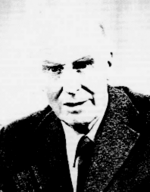V. C. Wynne-Edwards facts for kids
Quick facts for kids
Vero Copner Wynne-Edwards
|
|
|---|---|

Vero Copner Wynne-Edwards
|
|
| Born | 4 July 1906 |
| Died | 5 January 1997 (aged 90) |
| Nationality | English |
| Citizenship | United Kingdom |
| Alma mater | New College, Oxford |
| Known for | group selection |
| Awards | Neill Prize (1973) Frink Medal (1980) Walker Prize |
| Scientific career | |
| Fields | zoology |
| Institutions | McGill University (1930-1946) Aberdeen University (1946-1974) |
Vero Copner Wynne-Edwards (born July 4, 1906 – died January 5, 1997) was an important English zoologist. A zoologist is a scientist who studies animals. He was famous for his ideas about something called group selection. This is a theory that says natural selection (how living things change over time) can happen to a whole group of animals, not just to individual animals.
Contents
Life Story
Vero Wynne-Edwards was born in Leeds, England, on July 4, 1906. His father was a church leader named John Rosindale Wynne-Edwards.
He went to Rugby School and then studied zoology at Oxford University. After finishing his studies in 1929, he moved to Canada. There, he became a teacher of zoology at McGill University.
During the Second World War, he served in the Royal Canadian Naval Reserve. This means he was part of Canada's navy.
After the war, he returned to Scotland. He became a special professor at Aberdeen University in 1946. He worked there until he retired in 1974.
Awards and Recognition
In 1950, he became a Fellow of the Royal Society of Edinburgh. This is a special honor for scientists in Scotland. He also won the Society's Neill Prize between 1973 and 1975.
In 1974, he was given another big honor: he was made a Commander of the Order of the British Empire (CBE). Aberdeen University also gave him an honorary doctorate, which is like a special degree.
He lived in the Banchory area after he retired and passed away there on January 5, 1997.
Ideas on Group Selection
Wynne-Edwards was best known for his ideas about group selection. He wrote about this in his 1962 book, Animal Dispersion in Relation to Social Behaviour.
He believed that many animal behaviors developed for the good of the entire group or species. For example, he thought that animal groups had ways to control their population size. This would stop them from having too many babies and running out of food.
His ideas led to a big discussion among scientists. Other famous biologists like George C. Williams and Richard Dawkins talked a lot about his theories. Some scientists called his idea of group selection "naive," meaning it was too simple.
Wynne-Edwards suggested that if a group of animals was getting too big, they might do things like special displays. These displays would lead to fewer babies being born across the whole group. This idea was different from the usual natural selection theory, which focuses on individual animals. Scientists have not found clear proof for this specific mechanism.
Fellow of the Royal Society
In 1970, Vero Wynne-Edwards was chosen to be a Fellow of the Royal Society. This is a very high honor for scientists in the United Kingdom.
When he was nominated, they said he had made many important contributions to ecology. Ecology is the study of how living things interact with each other and their environment.
- He studied how birds behave in groups and how they follow rhythms.
- His work on birds in the North Atlantic Ocean showed that there are different zones (like close to shore, further out, and far out at sea). Each zone had its own types of birds. These zones are now used by other scientists.
- His most important work was about how animal populations change in relation to their social behavior. He suggested that animals have ways to control their population size at a good level. He believed that being social was very important for this.
- He also wrote papers about the animals and plants found in the Arctic regions.
Family Life
Vero Wynne-Edwards married Jeannie Morris in 1929.
Their son, Hugh Wynne-Edwards, became a professor of geology (the study of Earth's rocks and history). His granddaughter, Katherine Wynne-Edwards, is also a professor of biology (the study of living things) at the University of Calgary.
Books He Wrote
- Wynne-Edwards, V.C. 1962. Animal Dispersion in Relation to Social Behavior. Oliver & Boyd, London.
 | Percy Lavon Julian |
 | Katherine Johnson |
 | George Washington Carver |
 | Annie Easley |

